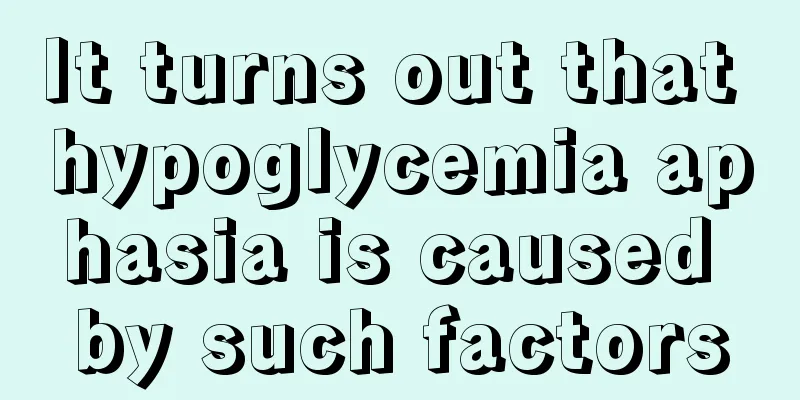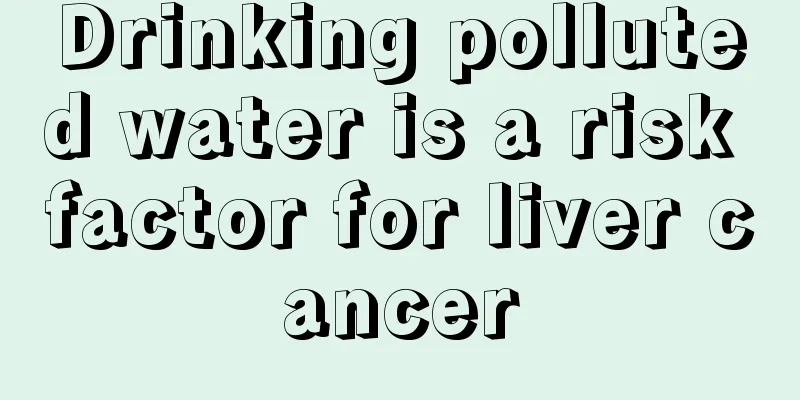It turns out that hypoglycemia aphasia is caused by such factors

|
Hypoglycemia is a common phenomenon in daily life and has a great impact on people's normal life and study. However, it has been circulated online recently that hypoglycemia can cause aphasia. So what exactly is hypoglycemia aphasia and what are its triggering factors? Let’s take a closer look at it below! Hypoglycemic aphasia is used to describe the phenomenon that others suffer from hypoglycemia due to busy work or dietary changes, which causes temporary incoherent speech and inability to communicate normally with others. The main cause of the disease is still hypoglycemia, and hypoglycemic aphasia is the result of hypoglycemia. Symptoms of sympathetic nerve excitement include: hunger, palpitations, sweating, headaches, blurred vision, etc. Mental symptoms include being in a daze, answering irrelevant questions, mental unrest, unclear consciousness, coma, etc. When mild hypoglycemia reactions such as palpitations, sweating, hand tremors, pale complexion, and fatigue occur, if not treated promptly, they will develop into severe hypoglycemia with symptoms such as limb and facial spasms, and even coma. Generally speaking, when the blood sugar concentration of a normal person is too low, less than or equal to 2.8mmol/L, and there is insufficient energy supply, symptoms of hypoglycemia will appear. In addition, when the blood sugar of diabetic patients cannot supply the body with enough oxygen and energy, they will also experience the same hypoglycemia symptoms as normal people, which may cause the occurrence of hypoglycemia aphasia. Causes of hypoglycemia aphasia 1. Excessive insulin dosage Excessive insulin dosage or failure to reduce insulin dosage in time after the condition improves. 2. Not having regular meals Due to meetings, visits, skipping breakfast for a long time, finishing work late, etc., eating or snacking is delayed compared to usual time. 3. Eating less and not understanding the amount of insulin The amount of food intake is reduced, but the insulin is not reduced accordingly. A significant increase in activity without corresponding increases in meals or reductions in insulin dosage can also lead to low blood sugar, which is not good for your health. 4. Improper insulin ratio The ratio of injected mixed insulin is inappropriate (PZI is 1 to 2 times more than RI) and the dosage is large, which often leads to high glucose in urine during the day and hypoglycemia at night. When ketosis occurs, insulin levels increase and food intake decreases. Not eating or snacking before the peak of insulin action. 5. Emotional changes When your mood changes from being tense to being relaxed and happy, this will also cause your blood sugar to drop, which is not good for your health. 6. Excessive use of PZI, drugs that aggravate hypoglycemia. |
<<: What is the treatment for hemangioma on the lip?
>>: What to do if you feel dizzy due to low blood sugar? It turns out this is the best first aid
Recommend
Principles of drug treatment for endometrial cancer
The treatment principles for endometrial cancer s...
Physiological floaters
There are many types of common diseases, and we n...
What medicine should children take for otitis media
The physical and mental health of every child con...
Can herpes be broken
Everyone knows the harm that herpes can cause to ...
What causes bitter taste in the mouth?
If you feel bitter in your mouth as soon as you w...
The harm of skin cancer to people
It is said that the body is the capital of revolu...
Screening and prevention methods for cervical cancer
After HPV infection, smoking, multiple pregnancie...
Can protein break down fat?
Protein can play a very important decomposition r...
Does steamed eggs with tomatoes have any effect on the human body?
Many people have eaten scrambled eggs with tomato...
The difference between knot pulse and substitute pulse
Everyone should be unfamiliar with knot pulse and...
What to do if there is too much bile in the stomach
Everyone has bile in their stomach as a result of...
How to extinguish moxibustion sticks
In fact, many people know that moxibustion can be...
What is the highest degree of contact lenses
It's understandable that many people prefer w...
Genetics is the main cause of prostate cancer
Men are all afraid of prostate diseases, and pros...
What are the high-risk groups for prostate cancer?
Prostate cancer is the most common malignant tumo...









